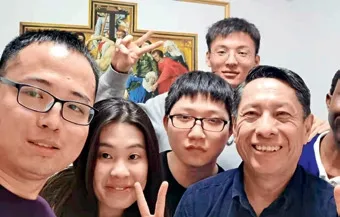Scientist at His Prime
Award-winning Mexican professor contributes to low-carbon steelmaking in China By Magdalena Rojas
Alberto Conejo has not lived in China long,but his contributions are strongly felt not only in the area in which he works as an expert, but also in the construction of a more environmentally friendly world as a whole.has to do with carbon dioxide emissions. In this sense, Conejo has made important contributions through his research to reduce energy consumption in steel production by using foamy slag as an insulator in electric arc furnaces.As the steel industry is the one that emits the largest amount of carbon dioxide emissions in the world—around 7 percent—the scientific community
A grain of sand
Conejo is not just any man. His dedication and work have earned him important recognition,but these achievements have not been without sacrifices. However, the Mexican, who has dedicated more than 30 years to the field of metallurgy and steel, does not hesitate to recognize the work of others as part of his achievements.The first time he arrived in China, he did it hand in hand with his wife for a one-year sabbatical from 2014 to 2015. “During that time we traveled to many parts of China; we went to remote villages, climbed mountains, crossed rivers and lakes, and visited old towns and museums,” he recalled.
Although Mexico “had almost everything,”there was something missing. For this reason,when the School of Metallurgical and Ecological Engineering at the University of Science and Technology Beijing (USTB) offered him a position as a researcher and professor under a sixyear contract, the Mexican did not hesitate to take flight. “My departure from Mexico is the product of an academic self-exile,” he said. “In Mexico,I had a huge house, a cabin in the mountains and a full-time cook.” But these material comforts were not enough for this Mexican, eager for new knowledge and to be able to spread it for posterity. “In recent years (in Mexico) I began to experience barriers as I tried to change to increase my academic productivity,” he said. “Without these changes I would have continued with a comfortable life, but that would have distanced me from my life’s work, which is to leave behind new knowledge.”
One of the biggest problems facing humanityhas focused on two approaches to address this problem: on the one hand, optimizing processes and, on the other, designing radically different processes. “The work I did focused on optimizing the use of electrical energy and minimize energy losses,” he said.

(Above) Mexican Ambassador to China Jesús Seade (left)presents an award to Alberto Conejo, a professor with the School of Metallurgical and Ecological Engineering at the University of Science and Technology Beijing,on November 9, 2021


Conejo (third right) with his students
These efforts led him to be awarded the Chinese Government Friendship Award on September 30 last year, the highest distinction for foreigners who have made outstanding contributions to the cause of the country’s modernization,reform and opening up. Although he is aware of his achievements, Conejo does not hesitate to say that this is also the result of shared teamwork.“The only thing I can say is that there are no individual achievements, but the results of a collective effort because in everything we do we use previously developed knowledge.”
An unbreakable bond
February this year was a historic milestone between China and Mexico, as it marked the 50th anniversary of the establishment of diplomatic relations between the two countries. However,this connection has a much older history. “The Silver Route existed for 300 years, from the 16th to the 19th century,” he said. “This is the background of the first globalization of world trade,where the accepted currency was not the dollar,but the peso made of silver, made in Mexico,”he said.
Apart from the fact that both countries have ancient civilizations with a strong historical and cultural legacy, the bond has been taking more and more shape and weight. This is something that Conejo recognizes as a key element in view of the need to strengthen international collaboration. “The current ambassador, Dr. Jesús Seade,has the preparation and experience to promote a new bilateral agenda that not only includes the commercial aspect, but also many more fields such as science and technology, tourism, among others.”
In addition, Conejo noted, diplomatic relations curiously became official on February 14,1972, Valentine’s Day and the Day of Love and Friendship in Mexico.
Although not everything has been easygoing,Conejo is grateful for life and cites the famous French playwright Victor Hugo to explain how he feels in China. “Where you are happy, there is your homeland,” he said. In addition, admiring the simple things in life that often go unnoticed by most mortals also helps.
“What I try to do every day in the morning is to stop on the way to work and look at the sky,the trees, the leaves dancing and feel the wind,”he said. “Then I close my eyes, breathe slowly and when I come back to reality, I feel happy.”
The academic community in which he finds himself has also been encouraging and supportive. In this regard, Conejo is amazed at the level and commitment of his students. “China produces more than half of the steel and has the largest steel-producing company in the world, so it is not surprising that it also has the world’s leading metallurgy department, which is where I work, at USTB.” For this reason, when it comes to work,his students give their all, even if it means working on Saturdays and Sundays, as Conejo learned shortly after assuming his position.
This commitment, together with the effort and work, are things that Conejo has learned from the Communist Party of China (CPC), which in July last year celebrated its 100th anniversary.For the occasion, there was a great celebration in Tiananmen Square, to which Conejo was invited.“It was a rocky and difficult start, but the changes in the last 40 years have given positive results that are unique in human history,” he said.
He added that one of the most important results achieved by the CPC is that it has been able to reinforce the unity of the Chinese people. “This is one of the cultural traits that I admire the most because it not only contributes to the happiness of the individual, but also makes it possible to understand mutual support and teamwork,” he said.
At 62, Conejo considers that he is at his prime to contribute from his field of study and accumulated experience. In this regard, he does not hesitate to continue his work. “I have started collaborating with other working groups to focus on the development of new technologies, since with the current ones we have almost reached the limit of reducing carbon dioxide emissions,” he said.“My goal is to continue working as part of a team until the last day of my life.” BR

